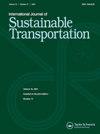Digital platforms for sharing and booking electrical vehicle charging infrastructure
IF 3.1
3区 工程技术
Q2 ENVIRONMENTAL STUDIES
International Journal of Sustainable Transportation
Pub Date : 2024-09-01
DOI:10.1080/15568318.2024.2407139
引用次数: 0
Abstract
Making road transport more sustainable is a vital part in reducing emissions, where the transition to electric freight vehicles (EFVs) are important. In this transition, there is a need for available electric vehicle charging infrastructure (EVCI). Many logistic companies are installing their own EVCI, which is primarily used during the night. This study explores how providers could share and users book charging on digital platforms for EFVs by conducting a qualitative study of a pilot project for sharing. The study shows that providers need financial incentive, available EVCI while not having charging as a primary business model. Users tend to have uncertainties about charging, avoid public charging, and would benefit from driver support. A digital platform enables a wide range of actors to participate, while providing payment solutions and vehicle identification. The study presents several sustainability drivers and barriers. Economic drivers include increased revenues, low-cost charging, and a possibility to invest in cheaper vehicles. Environmental drivers include improved usage, potentially fewer batteries, and supporting the sustainability transition. Social drivers include a community of sharing, easy comparison, and improving predictability. Economic barriers include limited demand, limited usage, and a lack of interest from the provider. Environmental barriers include the risk of under-utilization, overcapacity where many providers install EVCI, and the risk of stressing the grid when utilizing fast charging for large trucks. Social barriers include uncertainty about reliability, grid limitations, and a lack of trust of actors in the system.
共享和预订电动汽车充电基础设施的数字平台
使公路运输更具可持续性是减少排放的重要一环,而向电动货运车辆(EFV)过渡则是其中的重要一环。在这一过渡过程中,需要有可用的电动汽车充电基础设施(EVCI)。许多物流公司正在安装自己的 EVCI,主要在夜间使用。本研究通过对一个共享试点项目进行定性研究,探讨了供应商如何共享和用户如何在数字平台上预订电动汽车充电。研究结果表明,提供商需要经济激励、可用的电动汽车充电设施,同时不以充电为主要商业模式。用户往往对充电存在不确定性,避免在公共场所充电,并希望得到司机的支持。数字平台可以让广泛的参与者参与进来,同时提供支付解决方案和车辆识别。该研究提出了几个可持续发展的驱动因素和障碍。经济驱动力包括增加收入、低成本充电以及投资更廉价车辆的可能性。环境驱动因素包括提高使用率、可能减少电池数量以及支持可持续发展转型。社会驱动力包括共享社区、方便比较和提高可预测性。经济障碍包括需求有限、使用有限以及供应商缺乏兴趣。环境障碍包括利用率不足的风险、许多供应商安装 EVCI 的地方产能过剩,以及大型卡车使用快速充电时对电网造成压力的风险。社会障碍包括可靠性的不确定性、电网的局限性以及对系统参与者缺乏信任。
本文章由计算机程序翻译,如有差异,请以英文原文为准。
求助全文
约1分钟内获得全文
求助全文
来源期刊
CiteScore
8.90
自引率
2.60%
发文量
56
期刊介绍:
The International Journal of Sustainable Transportation provides a discussion forum for the exchange of new and innovative ideas on sustainable transportation research in the context of environmental, economical, social, and engineering aspects, as well as current and future interactions of transportation systems and other urban subsystems. The scope includes the examination of overall sustainability of any transportation system, including its infrastructure, vehicle, operation, and maintenance; the integration of social science disciplines, engineering, and information technology with transportation; the understanding of the comparative aspects of different transportation systems from a global perspective; qualitative and quantitative transportation studies; and case studies, surveys, and expository papers in an international or local context. Equal emphasis is placed on the problems of sustainable transportation that are associated with passenger and freight transportation modes in both industrialized and non-industrialized areas. All submitted manuscripts are subject to initial evaluation by the Editors and, if found suitable for further consideration, to peer review by independent, anonymous expert reviewers. All peer review is single-blind. Submissions are made online via ScholarOne Manuscripts.

 求助内容:
求助内容: 应助结果提醒方式:
应助结果提醒方式:


